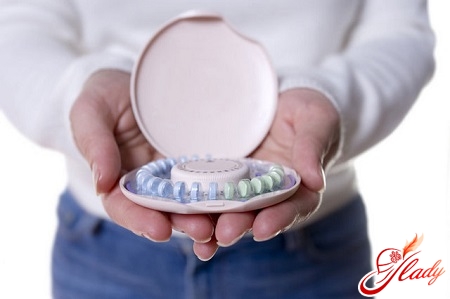
Very often after giving birth, women together withhis gynecologist selects the most appropriate means of contraception to avoid re-conception. Many are interested in the question of which contraceptive pills during lactation will not cause harm to the health of the baby. And such experiences arise not in vain. In fact, a large number of contraceptives can harm a child's health. But modern medicine has gone far ahead. Special drugs have been developed for a long time, which can be safely applied during the period of breastfeeding. Without causing any harm to the child, they serve as an excellent contraceptive for a woman. What means to choose and what to consider?
When is it necessary to take contraceptives?
After one birth and until the next pregnancymust pass at least two years. This time is necessary for the complete restoration of the body and the readiness to bear the child again. Not all women are newly conceived after childbirth brings joy, but for someone this is a serious problem. But not every woman thinks about means of contraception, referring to the fact that with breastfeeding the probability of becoming pregnant is significantly reduced. But is it really so? Do not so rely on this opinion. Contraception is also necessary for lactating mothers in the event that after birth it has been about six months. This is exactly the time when a woman's menstrual cycle is restored, and the baby is additionally fed by other foods other than breast milk. But there are cases when pregnancy occurs immediately after birth (in the first months). A sexually active woman can never be insured for 100% of an unwanted pregnancy, especially if she does not take any contraceptive or uses other contraceptives. Use contraceptives is recommended even for those who want to have another child. Here already play the role of medical indicators, indicating that before the full restoration of the uterus and in order to avoid serious complications it is necessary to wait at least a year, and only then again to plan the child. 
What contraceptives are recommended by doctors during breastfeeding?
Immediately it is necessary to say that the choice of contraceptivesdrugs for women who are breastfeeding, is very limited. Contraceptive for contraceptive mothers differ from contraceptive for all others in that they should be as reliable as possible and absolutely safe. When breastfeeding an absolutely useless method of contraception is an interrupted sexual intercourse, measurement of body temperature, as well as a calendar method. Such means of contraception can not be called reliable. Barriers to contraception (condoms) are able to get rid of unwanted pregnancy, but specially developed contraceptives for lactating women are considered to be the best means. It is possible to use spermicidal local drugs, among which there may be tablets, ointments and suppositories. There are cases when after giving birth a woman is recommended to use hormonal intrauterine systems (spiral). An obvious preference for gynecologists is given to birth control pills designed specifically for nursing mothers. Correctly selected drug is able to protect against unwanted conception, does not cause any harm to the health of the child, does not reduce the volume of breast milk.
What contraceptive pills are suitable for nursing mothers?
Common contraceptive pills,which were taken by a woman before pregnancy, are unlikely to fit after giving birth. It is already necessary to take specially designed for lactating mothers tablets. Such tablets should not contain estrogen - a hormone that is contained in all combined OK. The female hormone estrogen can significantly reduce the amount of milk and affect the health of the newborn baby. At the heart of specially formulated tablets for nursing mothers is the hormone gestagen. Medical research, conducted repeatedly, testify to the safety of this hormone. Gestagen is a natural hormone for the female body. During pregnancy, a high concentration of this hormone is characteristic. Contraceptive pills developed for women during lactation create such conditions in the female body that pregnancy has already begun. This indicates that the egg in such conditions is not able to ripen, and conception thus becomes impossible. 
More about contraceptives
The best protection against undesirableconception hormonal contraceptives are considered. With proper intake of hormonal contraceptive drugs can give a woman a high level of reliability and turn her sex life into a means of obtaining pleasure. During sexual intercourse you will not have to worry about a possible pregnancy, you can relax and enjoy the process. Modern means of contraception fall into two categories. The first category includes one-component drugs, which include only one hormone progesterone. Otherwise, this tool is called mini-saw. There are also two-component or combination preparations. In addition to progesterone, they contain the hormone estrogen. Two-component hormonal drugs are also divided into several types: drugs with microdoses of hormones, medium-dose, with low doses of hormones, there are also highly-dosed. Of all the pills for contraception, the most sparing should be considered mini-pili (one-component).
How do tablets for contraception work?
Contraceptive pill consists ofsynthetically created hormones, which are similar to female sex hormones produced during pregnancy. Progesterone and estrogen can inhibit the production of other hormones that contribute to the maturation of the follicles, due to which the process of ovulation occurs. Consequently, estrogen and progesterone, administered in small doses in the form of a tablet, are able to prevent or prevent the maturation of the egg. It is on this principle that the entire mechanism of action of COCs (combined oral contraceptives) is constructed. Mini-pili (one-component hormonal drugs) work in much the same way. But here special attention is paid to the mucous membrane of the uterus. Mini-pili are able to change the viscosity of the secret inside the cervical canal. Endometrium under the influence of these drugs becomes loose, and the viscosity of the secretion is significantly increased. This leads to the fact that it becomes very difficult for the spermatozoids to fertilize the egg, and the egg itself is no longer able to gain a foothold inside the uterus. After stopping the intake of such hormonal drugs, all these phenomena disappear, the reproductive function is restored two to three months after the end of the admission. If the contraceptive pills are taken strictly according to the instructions, their effect is almost 100% effective. In addition to contraceptive properties, such drugs can restore a woman's monthly cycle, relieve her of pain during menstruation, and resolve the problem of uterine bleeding. Taking hormonal pills, you can get rid of premenstrual syndrome, stop the growth of unwanted hair on the face and prevent the appearance of pimples on the skin. 
The use of alcohol and side effects during the intake of birth control pills
There is a possibility that efficiencycontraceptive tablets after applying large doses of alcoholic beverages may decrease. Most importantly, one should not allow alcohol poisoning, which can provoke vomiting. This can lead to the fact that the tablet, having drunk slightly earlier, will not be absorbed in the body. Drink alcoholic beverages should be in reasonable quantities, and the time interval between the drunk pill and alcohol should be at least two hours. In case of emergency, you can slightly shift the reception of the pill, drinking it, for example, in the morning. But in this case, you should strictly follow the instructions attached to the medicine. The use of birth control pills, like many other medicines, is often accompanied by side effects. At the very beginning of taking the drug, there may be spotting of blood from the vagina, which, as a rule, disappear after the body adapts to the drug. The hormone estrogen, which is part of the COC, can cause an increase in blood pressure, fluid retention, headaches, bloating, swelling in the legs. Hormone progestin can cause the appearance of acne on the skin, irritability and nervousness, contribute to weight gain. Taking medications can cause an increased appetite, which will lead to an increase in body weight. Elevated levels of the hormone estrogen can cause thrombosis of the vessels. Acceptance of some contraceptives means a complete refusal of a woman from smoking, which can cause a stroke or a heart attack. COCs can promote the formation of gallstones in the biliary tract and even cause attacks of cholelithiasis. Sometimes side effects can be observed when combined with anti-fungal drugs or antibiotics. 
Harm from taking birth control pills
As already mentioned, in a woman's life quite oftenthere are times when she thinks about the need for contraceptive drugs. To such periods it is possible to carry the period of lactation, postpartum period, period after miscarriage or abortion. During lactation it is advisable to use one-component contraceptives, which include a single hormone, progestin. Among such drugs - charosette, microlux, ekslyuton and many others. Admission COC is strictly prohibited, because they are able to harm the health of the newborn. Often there is a need to receive contraceptives after an abortion or a miscarriage. Hormonal pills of contraceptive action in addition to its basic function are also curative. It is known that combined OC can restore the hormonal background of a woman, serve as a means for the prevention of endometriosis, can cure fibro-cystic mastopathy. Applying COCs reasonably after the artificial termination of unwanted pregnancy, they are able to reduce the risk of inflammatory diseases. Combined OK include regulon, femoden, mercilon, logest, ri-merci, silest, yarina, diane-35, belar and others. This means with an average content of estrogens (not more than 35 μg). Already after taking the first pill there is an effect from its use. These drugs do not require the use of any other additional methods of contraception.
COC admission after birth and cancellation of contraceptives
According to statistics, every tenth woman becomes pregnant inthe first months after childbirth. This pregnancy is often undesirable and requires interruption. To select a contraceptive drug after childbirth follows individually, taking into account the peculiarities of the organism. Two or three months after childbirth, it is recommended to start taking OC, which will protect against re-conception. As a rule, with breastfeeding in the first five to six months after the onset, a woman is infertile. If breastfeeding is carried out, then during the first five months you can not use any contraceptive. Reception of contraceptive preparations should begin not earlier, than in six-seven weeks after sorts. Experts have proved that taking OC does not have a negative effect on the fetus in the early stages of pregnancy. Nevertheless, after it is determined that the pregnancy has come, it is recommended that the contraceptive preparations be discontinued immediately. Cancellation of OC in other cases is characterized by the restoration of the ovulation process within two to three months after the end of admission. After the cancellation of drugs, it is recommended to see a gynecologist, who will check for inflammatory and infectious diseases, and sometimes for the presence of cancer of the uterus. Probability to conceive a child after the end of the intake of OK is very high. Thus, you can perfectly plan your pregnancy.
Are there any contraindications for taking oral contraceptives?
Absolutely any medicationimplies the presence of contraindications, and hormonal contraceptive drugs - not an exception. So, reception of OK is shown for smoking women, whose age exceeds 35 years. Severe liver disease (cirrhosis, hepatitis) is a serious contraindication for taking hormone tablets. Complicated diabetes mellitus, vein thrombosis, ischemic heart disease, suffered heart attack or stroke, hypertension, rheumatoid arthritis and many other diseases are a serious contraindication for taking oral contraceptives. With the existing depression, migraine, varicose veins, diabetes, PMS, the OC should be used strictly under the supervision of a gynecologist. Very rarely after the withdrawal of the drug, women experience frequent depressions, menstruation, sometimes skin problems, etc. Women are frightened and wonder if they did not depend on taking steroid drugs. Do not be scared, medical research has shown that there is no dependence on taking hormonal medications. It can only say that the drug was picked up incorrectly. After a while, all the symptoms go away. So, there is a huge amount of means to protect against unwanted conception and pregnancy. All drugs have their pros and cons. Like all other drugs, contraceptives have their own contraindications and side effects. The choice of a contraceptive should be carried out together with the attending physician, otherwise incorrectly selected medicine can harm the body. In order to avoid all negative consequences, it is not recommended to choose these drugs on your own. And the period of breastfeeding requires special attention and choice of remedy. It is necessary to carry out it only with the help of a doctor who will choose the one that is most suitable for you.









